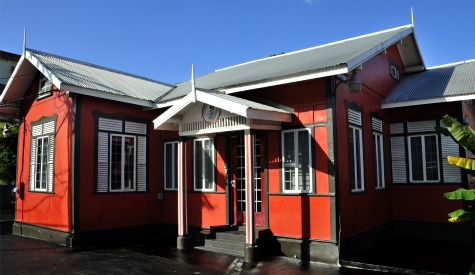 The Trinidad and Tobago Olympic Committee (TTOC) is an independent organization responsible for providing Trinidad and Tobago athletes with resources they need to achieve goals at the Olympics, Youth Olympics Games (YOG), Central American and Caribbean Games (CAC Games), Pan American Games (Pan Am Games), Commonwealth Games and Youth Commonwealth Games.
The Trinidad and Tobago Olympic Committee (TTOC) is an independent organization responsible for providing Trinidad and Tobago athletes with resources they need to achieve goals at the Olympics, Youth Olympics Games (YOG), Central American and Caribbean Games (CAC Games), Pan American Games (Pan Am Games), Commonwealth Games and Youth Commonwealth Games.
In addition, the TTOC actively promotes structured physical activity and the history and values of the Olympic Movement through a variety of cultural and educational programs under its Olympic Academy.
The TTOC consists of National Sporting Organizations (NSO’s) whose sport is recognized by an International Federation (IF).
The TTOC is funded principally through grants from the Pan American Sport Organization (PASO), the International Olympic Committee (IOC) and corporate sponsorship. The TTOC is non-profit and independent of Government and Government funding other that contributions by the Ministry of Sport to the national team’s representation at International Games.
The TTOC is committed to Trinidad and Tobago athletes through the development of high performance sport. Our role also extends to promoting structured physical education and sustainability, and spreading the Olympic ideals throughout our communities even in the years between Olympic Games.
History of the Trinidad and Tobago Olympic Committee (TTOC)
The Birth of the Trinidad and Tobago Olympic Committee
After seven years of World War II, in which international sport had been completely discontinued and local sport severely curtailed, the world returned to normalcy in 1945. Plans were in place to hold the Olympic Games in 1948 in London. This prompted the formation of the Trinidad and Tobago Olympic Association (TTOA) in 1946. The name was eventually changed to the current Trinidad and Tobago Olympic Committee (TTOC).
Trinidad and Tobago, then a British Colony was eager to compete in the Olympic Games and the TTOA came into being as a working committee to take the country into the Central American and Caribbean Games in Barranquilla, Colombia in 1946. Thus, formal affiliation to the International Olympic Committee (IOC) was granted to Trinidad and Tobago at the IOC session in 1948.
The TTOC adheres to the aims of the IOC, which are not merely to win medals at Games but to promote:
(a) The development of the physical and moral qualities which are the basis of sport
(b) To educate young people through Sport to a better understanding between each other, thereby helping to build a better and more peaceful world
(c) To spread the Olympic principles throughout the world, thereby creating International Goodwill
(d) To bring together the athletes of the world in the great four-yearly Sport Festival.
In keeping with those aims, the TTOC’s main responsibility is to ensure the representation of sportsmen and women from this country at the Olympic Games and to ensure the protection and development of the Olympic Movement and sport in general.
By those efforts it is hoped that the TTOC would teach and encourage respect for the fundamental principles of Olympism; act as a link with the National Sport Federations affiliated to the International Federations recognised by the IOC; encourage and assist the government of the country in the enforcement of a Sports Program for Youth, with a view to developing character, health and civic sense; oppose any political or commercial interference and any religious or racial discrimination in sport; propagate a program meant to enlighten the public and media on Olympic Philosophy.
From four (4) affiliates in the year 1948, the Trinidad and Tobago Olympic Committee now has thirty-six (36) affiliated National Sport Organizations (NSO’s). Click here to see the list of the TTOC affiliates.
Mission, Vision and Guiding Principles
The Trinidad and Tobago Olympic Committee’s Mission and Vision Statements are what drive us as an organization and encourage us to do what we do on a daily basis. They are the reasons for our very existence, and should serve as a reminder to all of the great responsibility that is ours.
Mission:
To support Trinidad and Tobago’s National Sporting Organisations in achieving sustained levels of competitive excellence and preserve the Olympic ideals while inspiring and involving all Trinbagonians.
Vision:
- Improve all aspects of Sport in conjunction with our stakeholders
- Provide pathways for the successful design and implementation of “Sport for All” program in the Trinidad and Tobago
- Create and sustain educational environment for learning and development through an Olympic structure
- Provide support to Trinidad and Tobago’s athletes and National Sporting Organisations in achieving sustained levels of development and competitive excellence.
Guiding Principles:
- Honesty, integrity and trustworthiness in all dealings
- Respect for the rights, difference and dignity of others
- Accountability and transparency
- Achievement of excellence
- Stewardship of the Olympic Movement

























